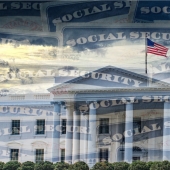At a wealth management firm, we spend a lot of our time preparing for all potential probabilities that can affect our clients’ financial lives. Some scenarios we attribute high probabilities to and others have super low probabilities. Our jobs include thinking about all potential scenarios and having plans in place to make sure our clients are still able to lead secure, stable, and fulfilled lives for themselves and their families.
What we find is that the media always jumps from one worst-case scenario to the next because fear is a great selling tool. However, from a financial markets standpoint, the most important factor that keeps society moving forward is that human beings continue to create cool things that other human beings want to use. Our goal is to invest in all of those cool ideas.
Here is the latest list we have put together of all the terrible scenarios to plan for.
1. Economic Slowdown and Recession Fears
The global economy has shown signs of deceleration, with major economies such as the US, China, and the Eurozone experiencing slower growth. Persistent inflation, high interest rates, and geopolitical tensions have contributed to this slowdown. A full-blown recession remains a possibility, and any confirmation of this could lead to heightened market volatility as investors reassess their risk exposures.
2. Inflation and Central Bank Policies
Inflation continues to be a thorn in the side of many economies. Central banks worldwide, particularly the Federal Reserve, the European Central Bank, and the Bank of England, are likely to maintain a hawkish stance. Any unexpected moves or statements from these institutions could create significant market disruptions. Investors will be particularly sensitive to interest rate hikes, which can increase borrowing costs and reduce corporate profitability.
3. Geopolitical Tensions
Geopolitical risks are ever-present and have been particularly pronounced in 2024. Ongoing conflicts, trade wars, and political instability in various regions can lead to sudden market shocks. The situation in Eastern Europe, the Middle East, and the South China Sea are areas of concern. Any escalation in these regions could have a ripple effect across global markets.

4. US Presidential Election
The upcoming US Presidential election adds another layer of uncertainty. Markets typically dislike uncertainty, and the months leading up to an election are often volatile. Policy shifts, campaign rhetoric, and election outcomes can all significantly impact market sentiment. Investors will be closely monitoring candidates’ positions on taxes, regulation, and trade.
5. Corporate Earnings and Forecasts
Corporate earnings season is always a critical period for stock markets. Companies’ performance in the third and fourth quarters will provide insights into the health of the economy. Disappointing earnings reports or cautious forward guidance can trigger sell-offs. Sectors like technology, finance, and consumer goods will be under particular scrutiny.
6. Supply Chain Disruptions
Despite some improvements, supply chain issues continue to plague various industries. The lingering effects of the COVID-19 pandemic, combined with geopolitical tensions, have created bottlenecks. Disruptions in the supply chain can lead to increased costs and lower revenues, particularly for manufacturing and retail sectors.
7. Technological Disruptions and Cybersecurity Threats
The rapid pace of technological advancement brings both opportunities and risks. Cybersecurity threats have become more sophisticated and can cause significant damage to companies and economies. Additionally, technological disruptions can create market volatility, as seen with the rapid rise and fall of cryptocurrencies and tech stocks.
8. Environmental Risks and Climate Change
Environmental concerns are increasingly influencing market dynamics. Natural disasters, extreme weather events, and climate change policies can all impact stock markets. Investors are paying more attention to companies’ environmental, social, and governance (ESG) practices, and any adverse events could lead to sudden shifts in market sentiment.
9. Consumer Sentiment and Spending
Consumer confidence is a vital indicator of economic health. Any significant decline in consumer sentiment can lead to reduced spending, impacting businesses across the board. Factors influencing consumer confidence include inflation, unemployment rates, and broader economic conditions.
10. The US Dollar is no longer the world’s reserve currency
The US Dollar has been used globally as a reserve currency for the last 70 years because of the relative stability of the currency vs other means of exchange. It is certainly possible that globally, we determine that some other means of exchange is more reliable in the next 100 years and we all start using that as currency. From a personal finance standpoint, it’s important to remember that any currency is never designed to be a store of value. It doesn’t matter if it is shells, dinars, gold, euros, dollars, bitcoin, ethereum, or grains of sand. The point is we all agree that these currencies have a certain value that we can trade other assets with. The thing that actually has value is those underlying assets like food, shelter, real estate, land, commodities, and ownership in businesses that are creating great products.
Conclusion
This is just a brief list of the stuff that can affect finances in the next few months. There are hundreds of other variables in addition to this list. Once we have answers to some of these issues, they will be replaced with new issues. It’s always important to evaluate the potential impact of all of these variables on our financial lives and create plans that include all probabilities. Entrusting your financial lives to a good wealth management team should mean that you pass on the tracking, evaluating, and acting on such variables to a knowledgeable experienced team that you trust.



